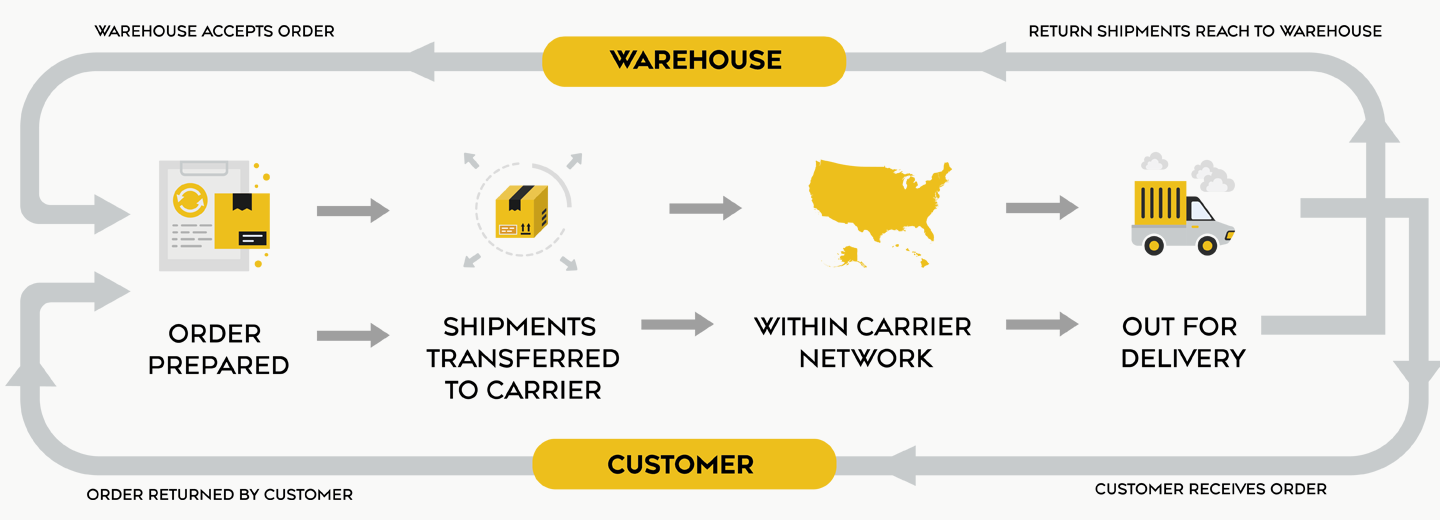Ecommerce logistics, also known as elogistics, encompasses the various procedures that an ecommerce business employs to fulfill customer orders. This includes order processing, packing, shipping, delivery, and in certain instances, returns. While the specific details may vary depending on the company, ecommerce logistics comprises multiple interconnected components that ensure a seamless customer experience.

The various elements comprising the supply chain logistics for e-commerce
The process of ecommerce logistics is intricate and involves multiple steps, where each component depends on the others. For ecommerce brands to ensure prompt and efficient delivery of online orders to customers, it is crucial that all aspects of the logistics chain function smoothly.”
E-commerce order fulfillment
Ecommerce fulfillment encompasses all the activities that take place within a warehouse to prepare an order for shipping in the ecommerce logistics process. These activities may involve warehousing, storing, packing, and handing over the order to a carrier for delivery. It also entails managing inventory across multiple warehouses in the ecommerce supply chain.Moreover, the ecommerce fulfillment process is crucial as it has a significant impact on the customer’s unboxing experience. During the fulfillment process, an ecommerce brand has the opportunity to decide on the packaging, packing materials, free samples, and the shipping carrier for the order.In essence, the fulfillment process provides a means for a brand to connect with its customers throughout the online transaction, which can influence how the brand is perceived by its customers.
Inventory management
Effective ecommerce inventory management is essential whether you have one warehouse or multiple facilities. Without it, operations can quickly become disorganized and chaotic. By accurately monitoring stock levels and locations, businesses can keep up with current and projected demand, enabling them to fulfill online orders quickly and avoid frustrating delays for customers.This is particularly crucial for ecommerce brands that sell items like clothing and shoes, which come in a range of sizes and colors. They need to implement the right inventory management and warehouse management software to track merchandise effectively across their entire supply chain. Alternatively, they can choose to partner with a reliable 3PL provider to handle inventory management tasks on their behalf.
Ecommerce Warehousing
As an ecommerce brand experiences growth in sales, they will require more storage space to accommodate their increasing inventory. Selecting a suitable warehouse involves careful consideration of inventory levels and storage locations around the globe, as well as ensuring seamless communication with the supply chain to maintain optimal inventory levels and prevent delays in fulfilling customer orders.Additionally, warehouse location plays a crucial role in ensuring timely delivery of orders. The distance between the fulfillment center and transportation hub can add precious time to delivery windows, making it essential for ecommerce brands to choose strategic warehouse locations to minimize shipping times and meet customer expectations.
Returns and reverse logistics
Due to the high number of shoppers returning purchased items and expecting swift refunds, the ecommerce returns procedure has becomea critical component of the post-purchase experience. Online businesses must guarantee that their reverse logistics are as efficient as theirfulfillment process. Missing packages can result in postponed refunds, which can have an impact on customer satisfaction.Moreover, lost items can result in double loss as they cannot be resold once a refund has been issued.
What is ecommerce supply chain
The ecommerce supply chain refers to the integrated network of systems, procedures, and physical components that are involved in thesourcing, production, storage, and delivery of products to customers in the online marketplace. It encompasses various elements suchas manufacturing, inventory management, warehousing, distribution, fulfillment, and shipping carriers, among others.As an ecommerce enterprise, it is vital to ensure that every aspect of the supply chain operates seamlessly to enhance efficiency andoptimize customer satisfaction, which in turn yields cost-effectiveness.
Improving your branding experience
Are you struggling to keep up with the high demand in ecommerce? Let 4CUS help simplify running your business with our solution-driven approach.





Leave a Reply